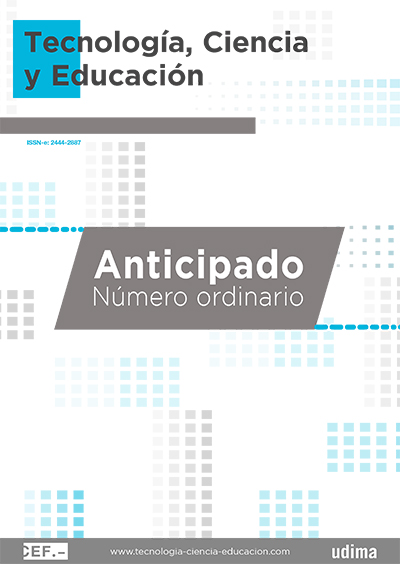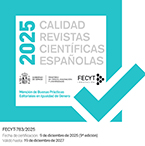Critical analysis of educational inclusion from a blockchain technology perspective
DOI:
https://doi.org/10.51302/tce.2025.24303Keywords:
inclusion, education, blockchain, technology, credentials, transparency, decentralizationAbstract
Educational inclusion has become a fundamental pillar in educational system policies and reforms, aimed at ensuring equitable access, active participation, and academic success for all students, especially those from historically marginalized groups. In this context, the emergence of disruptive technologies such as blockchain represents a transformative opportunity to reconfigure traditional educational structures, which are often exclusionary or burdened by bureaucracy.
As education shifts toward more digital, open, and decentralized models, it is essential to examine how blockchain technology can not only revolutionize educational management but also foster more inclusive learning environments. This article offers a critical analysis of blockchain´ s role in educational inclusion, exploring its practical applications such as immutable credential recording, decentralized digital identity creation, the issuance of microcredentials, and the use of smart contracts to automate administrative processes.
Through the analysis of relevant case studies, such as MIT Media Lab, the University of Nicosia, and IEBS Business School, and a comprehensive review of recent scientific literature, this article contributes to a deeper understanding of the present and future implications of integrating blockchain technology into inclusive educational policies and practices.
Downloads
References
Apraxine, D. y Stylianou, E. (2017). Business intelligence in a higher educational institution: the case of University of Nicosia. 2017 IEEE Global Engineering Education Conference (EDUCON) (pp. 1.735-1.746), Atenas, Grecia, 2017. https://doi.org/10.1109/EDUCON.2017.7943085
Avellaneda, O., Bachmann, A., Barbir, A., Brenan, J., Dingle, P., Hamilton Duffy, K., Maler, E., Reed, D. y Sporny, M. (2019). Decentralized identity: where did it come from and where is it going? IEEE Communications Standards Magazine, 3, 10-13. http://dx.doi.org/10.1109/MCOMSTD.2019.9031542
Chen, G., Xu, B., Lu, M. y Chen, N.-S. (2018). Exploring blockchain technology and its potential applications for education. Smart Learning Environments, 5(1), 1-10. https://doi.org/10.1186/s40561-017-0050-x
Gräther, W., Kolvenbach, S., Ruland, R., Schüter, J., Torres, C. y Wendland, F. (2018). Blockchain for education: lifelong learning passport. Proceedings of the IEEE Frontiers in Education Conference. https://doi.org/10.18420/blockchain2018_07
Grech, A. y Camilleri, A. F. (2017). Blockchain in Education. JCR Publication Repository. European Commission Joint Research Centre.
Gromyko, A., Luca, P., Perez, S., Rozowic, R., Shaheen, T., Stelea, M. y Tao, S. (2023). Understanding blockchain technology and its implications. OxJournal. https://www.oxjournal.org/blockchain-technology-and-its-implications
Jain, D., Garg, A., Khosla, T. y Kumar, V. (2023). Adoption of blockchain technology in education: application & its challenges. International Journal for Research in Applied Science and Engineering Technology (IJRASET), 11(1), 468-472. https://doi.org/10.22214/ijraset.2023.48602
Jaime Maestre, R. (2019). La blockchain revolucionarà la comunicació de l´empresa. Comunicació. Revista de Recerca i d´Anàlisis, 36(1), 95-116. https://revistes.iec.cat/index.php/TC/article/view/145793/144319
Jaime Maestre, R. (2020). Un ejemplo de educación financiada mediante criptomoneda: la ICO de la IEBS Business School. Tecnología, Ciencia y Educación, 15, 143-163. https://doi.org/10.51302/tce.2020.375
Jaime Maestre, R., Bermejo Higuera, J., Gámez Gómez, N., Bermejo Higuera, J. R., Sicilia Montalvo, J. A. y Orcos Palma, L. (2023). The application of blockchain algorithms to the management of education certificates. Evolutionary Intelligence, 16, 1.967-1.984. https://doi.org/10.1007/s12065-022-00812-0
Li, X., Jiang, P., Chen, T., Luo, X. y Wen, Q. (2017). A survey on the security of blockchain systems. Future Generation Computer Systems, 107, 841-853. https://doi.org/10.1016/j.future.2017.08.020
MIT Media Lab. (2016). Blockcerts: the Open Standard for Blockchain Certificates. https://www.blockcerts.org/
Nakamoto, S. (2008). Bitcoin: A Peer-To-Peer Electronic Cash System [Libro blanco].
Rivera-Vargas, P. y Lindín Soriano, C. (2019). Blockchain in the university: a digital technology to design, implement and manage global learning itineraries. Digital Education Review, 35, 130-150. https://doi.org/10.1344/der.2019.35.130-150
Sharples, M. y Domingue, J. (2016). The blockchain and Kudos: a distributed system for educational record, reputation and reward. Proceedings of the 11th European Conference on Technology Enhanced Learning (pp. 490-496). https://doi.org/10.1007/978-3-319-45153-4_48
Sun, J., Yan, J. y Zhang, K. Z. K. (2020). Blockchain-based sharing services: What blockchain technology can contribute to smart cities. Financial Innovation, 2(1), 1-9. https://doi.org/10.1186/s40854-016-0040-y
Tapscott, D. y Tapscott, A. (2016). Blockchain Revolution: How the Technology Behind Bitcoin is Changing Money, Business, and the World. Penguin.
Turkanovic´, M., Hölbl, M., Košic´, K., Hericˇko, M. y Kamišalic´, A. (2018). EduCTX: a blockchain-based higher education credit platform. IEEE Access, 6, 5.112-5.127. https://ieeexplore.ieee.org/abstract/document/8247166
UNESCO. (2017). A Guide for Ensuring Inclusion and Equity in Education.
Downloads
Published
How to Cite
Issue
Section
License
Copyright (c) 2025 Raúl Jaime Maestre

This work is licensed under a Creative Commons Attribution-NonCommercial-NoDerivatives 4.0 International License.


























